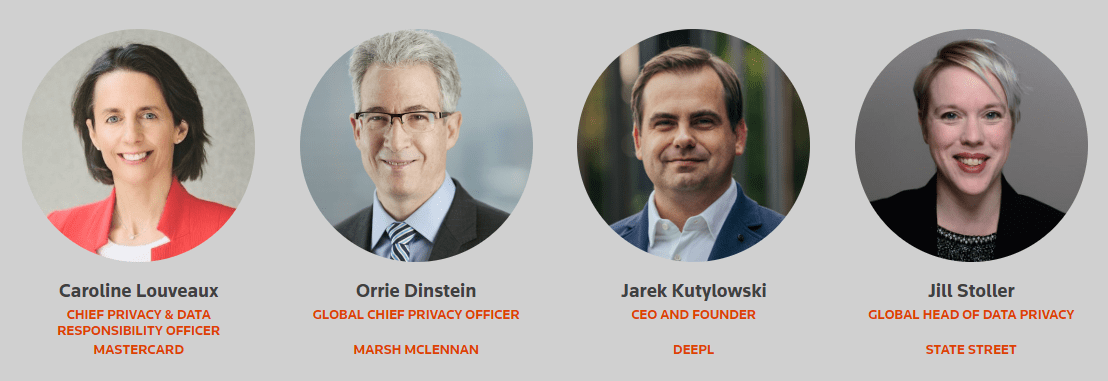Legal and privacy teams lead the way in AI governance and opportunity
The world’s largest companies are taking a global view of the use of artificial intelligence in their operations. It turns out there are no easy answers when it comes to commercialization, data privacy, and intellectual property. But there are incredibly smart people on your legal team looking at the risks and helping companies navigate them.
Reuters hosted a webinar exploring the use of AI for global business communication. The panel was moderated by Pete Carkeek, Enterprise AI Content Lead at Reuters, and included:

As the panel discussed the risks and opportunities of AI in global operations, it became clear that legal and privacy teams are poised to lead their companies through the exciting era of AI commercialization and establish themselves as critical business partners.
 | WebcastUnlock the power of AI to enable safe and secure global business communication
|
Key opportunities for AI to support global operations
Each panelist had examples of ways their company has innovated with AI to improve their operations. Louveaux noted that Mastercard used AI to avoid $35 billion in fraud costs. The company has found massive efficiencies and improved personalization with customers.
According to Dinstein, Marsh McLennan uses AI to automate, expedite, and simplify existing tasks. “The ability to use AI to analyze data and generate initial drafts of reports or recommendations about product placement is a tremendous opportunity for our industry,” he said.
Deepl provides text translation services to customers around the world. Customers use Kutylowski’s tool to build understanding across cultures, languages, and countries. An AI copilot for language helps people be more efficient and more understandable in daily work. It helps with customer service, localizing websites, and translating internal communications to a global workforce.
Stoller said that State Street Corporation uses deep data mining to give customers more customized research and insights and customize the client portal.
Risks of embedded AI
One challenge for any company sitting on a lot of data is making sure they can manage it in a way that is ethical and complies with all relevant rules and regulations. “This is especially true for large multinational corporations or those that have grown through acquisitions,” Stoller said.
That’s because products and applications using AI have come together under different governance structures or local regulations.
Other risks with AI include risks to people’s privacy, breaches of intellectual property rights, and hallucinations. “Companies have to address these risks to build trust in technology,” Louveaux said.
One way to mitigate these risks is for companies to remember that they are tools, not a replacement for human skills. Dinstein said that companies need to take advantage of the capabilities AI offers without giving up control.
“If you rely blindly on that tool, you are going to make mistakes,” he said. We have to educate people on how to use the tool without overly relying on it.”
The legal team as leaders in AI governance
The privacy officers on the panel noted that they are often called upon to lead AI risk assessments. To some extent this may reflect a lack of understanding of the breadth of the risks – they aren’t all related to privacy, after all.
“The only way to have effective AI governance is to have a partnership across different teams, skillsets, and backgrounds,” Louveaux said. “In my company, the privacy team takes the lead because we are used to orchestrating and convening different parts of the organization together.”
Indeed, legal teams often lead cross-functional initiatives and bring together multiple stakeholders. As Kutylowski asserted, these governance committees will need people who are able to assess the impact of AI, including the quality of the data and outputs. Strong leadership will lead to better assessments and guardrails set by experts in risk and the subject matter.
Privacy officers and legal teams are establishing themselves as leaders and trusted advisors in the commercial use of AI. As these efforts are successful companies will build trust internally and with their customers. Louveaux offered these suggestions for restoring or building that trust:
- Have very clear rules of the road and values around how you want to use AI.
- Invest in AI governance framework. This includes policies, tools, and processes.
- Remember that AI doesn’t just create risks – it can be part of the solution. For instance, it can help mitigate bias and aid in encryption to fully protect people’s privacy while allowing you to extract value from the data.
Dinstein also noted the importance of using tools that you trust. Marsh McLennan opted to have its own instance of a generative AI tool rather than sending data back and forth to Open AI. That gave the company control over how the data was used and reduced the chance of it being subject to an attack.
AI for the legal team
While the panel discussed the risks and opportunities of AI on a company-wide level, many of the issues apply at the law department level as well. It’s important to choose AI tools built on trusted datasets by companies you trust. It’s also important to be sure that the AI is supplementing human expertise, not replacing it. In-house legal teams can apply these principles to help identify, implement, and govern tools that will help their companies and departments modernize and grow.
Generative AI will continue to change how companies go to market and how legal teams provide advice and guidance. Thomson Reuters helps you work more efficiently and surface valuable insights with AI capabilities you can trust.
 | WebcastUnlock the power of AI to enable safe and secure global business communication
|









